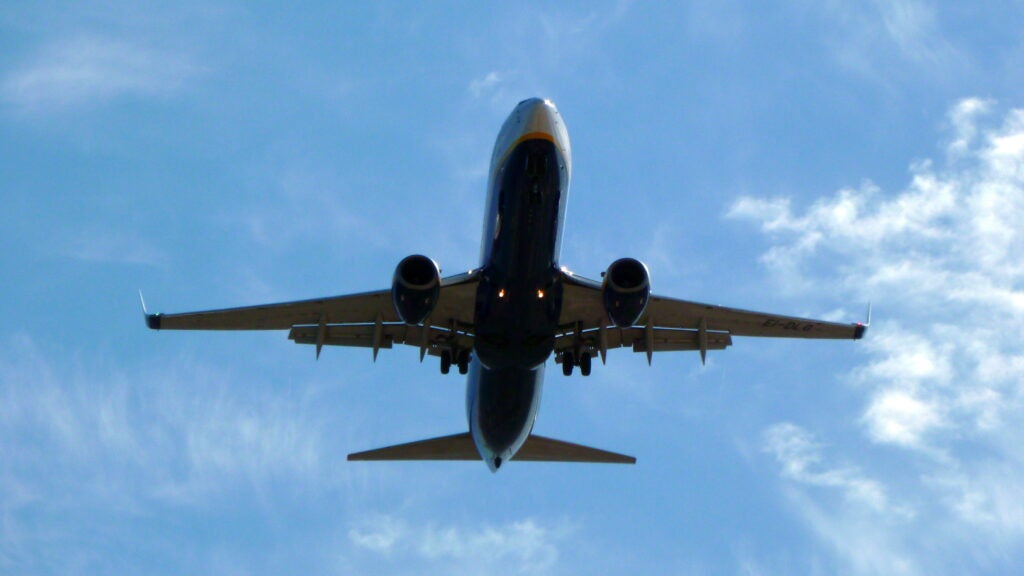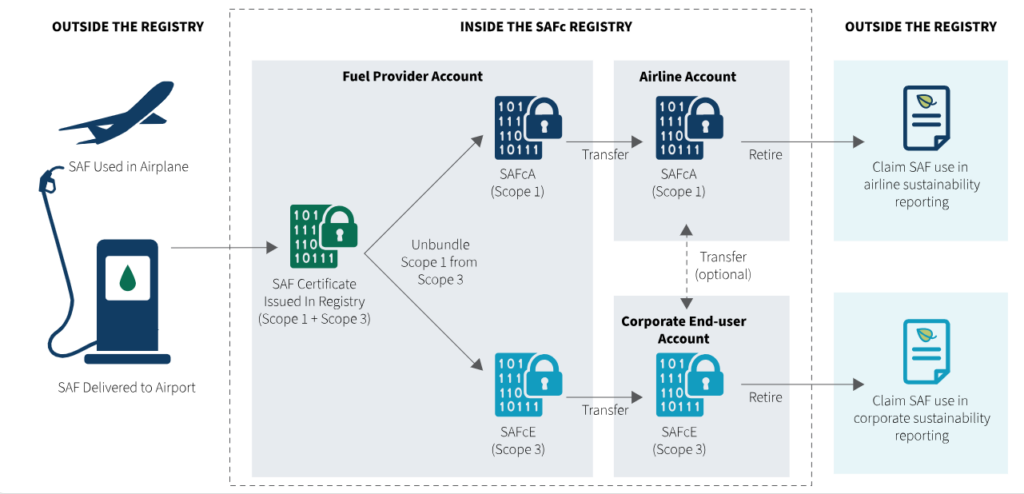By Istvan Bart, Climate Director
Last week, Virgin Atlantic became the first commercial airline to fly across the Atlantic ocean using 100% sustainable aviation fuels , demonstrating the incredible potential of clean, alternative fuels for flight. We need more planes flying on SAF, because if aviation were a country, it would be one of the world’s top 10 sources of greenhouse gas pollution.
That’s why I’m so excited about an innovative new tool that EDF is launching today at COP28 with RMI and the Sustainable Aviation Buyers’ Alliance — a registry that supports corporations working to reduce their aviation footprints by purchasing sustainable aviation fuel certificates, or SAFc, with a consistent, transparent and verifiable record to enable credible climate disclosure. SAFc is a critical tool to connect aviation customers with SAF producers who need fresh investments to scale up SAF production, and the registry is a critical piece of infrastructure to give SAFc users confidence in this mechanism.
How a new carbon certificate registry could jump-start global production of sustainable aviation fuels Share on XThe moment is right since so many corporations all over the world are working hard to reduce their carbon footprints — and looking for new approaches. Because business travel and air freight can be difficult to reduce, many companies purchase carbon credits to offset their emissions. Until recently, cutting back on travel and purchasing high-integrity carbon credits were the best and most accessible options for companies seeking to reduce their travel emissions.
Now, sustainable aviation fuel certificates offer companies who are serious about reducing their travel emissions a new tool to reduce greenhouse gas levels. Enabling new levels of investment in high-integrity SAF, SABA has been working for the past two years to develop the SAF certificate mechanism and facilitate joint procurement efforts to help companies help our planet. The SAFc Registry will bring further rigor and confidence to all aviation customers’, airlines’ and fuel providers’ existing procurement efforts by ensuring that contracted SAF was produced and delivered with certified sustainability attributes. With the registry, corporations can be certain that every gallon of SAF they have invested in was used in a plane to replace fossil jet fuel.
The focus on high-integrity SAF is critical because when SAF is produced with high environmental integrity — rather than relying on raw materials and pathways that can cause deforestation and harm the planet — it can significantly reduce aviation’s climate impact.
Because SAF production is still scaling up, current supplies are only available at a few dozen airports. But corporations that are interested in using SAF are spread all over the world, and many would never purchase physical fuel. This mismatch hampers the scaling up of SAF — a problem that SAF certificates solve. Taking a page from the renewable energy certificates policy playbook, SAF certificates unbundle the emission reductions from the fuel itself. That means companies and airlines that are nowhere near a real-life SAF refinery can support the growth of SAF by buying SAF certificates today.
Managing a SAF certificate system requires robust bookkeeping, including the tracking of specific emission reductions realized by using a particular batch of SAF, ensuring that only one SAF certificate is issued for each ton of SAF. It’s also important to have a reliable and publicly accessible record of the retirements of SAF certificates, so the public can verify the emissions reduction claims made in corporate sustainability reports. This is the work of registries.
Even though high-integrity SAF is plays a critical role in decarbonizing aviation, it has accounted for only around 0.1% of all fuel used in aviation in 2022. This underlines the need for rapidly generating more demand for SAF, and this is precisely what SAF certificates can do by allowing aviation customers to participate in the SAF market through the use of SAF certificates.
Building on the experience of other fledgling registries, the comprehensive new SAFc Registry is designed to meet the specific needs of corporations seeking to reduce their aviation footprints. The SAFc registry is independent, transparent, reliable, science-based — and it offers three key features that no other registry can match:
- Spotlight on SAF integrity: The SAFc Registry creates and labels SAF certificates with one of three sustainability tiers based on the rigor of their environmental certifications. Not all SAF is created equal, and the SAFc Registry will help the business sector support the use of high-integrity SAF whose feedstocks won’t risk deforestation and harm to the climate. These tiers will make it easy for buyers to opt for and confirm delivery of high-integrity SAF certificates that offer maximum impact in fighting greenhouse gas emissions, and match their sustainability goals.
- Separate Scope 1 and Scope 3 claims:The SAFc Registry creates not one, but two units for each ton of voluntary SAF registered. One unit represents Scope 1 emissions, which can be claimed by the airlines that actually burn the fuel. The other unit represents Scope 3 emissions, which can be claimed by the corporations whose employees and freight may travel on different planes that don’t have access to SAF. By accounting for emissions on both sides of the SAFc coin, the emitter and the consumer the SAFc Registry builds a win-win solution to scale up SAF more quickly. By creating a separate and fully transferable Scope 3 unit, the SAFc Registry gives corporations more flexibility in their climate disclosure needs and procurement models. This design can, among other things, make it simpler for corporations to buy and claim SAFc directly from fuel producers
- Unmatched transparency: The SAFc Registry is a fully transparent registry system offering environmental scrutiny. Information on retirements will be made publicly available so that all stakeholders can verify the sustainability claims made by corporations.
Someday every airport will offer SAF on every flight. In the meantime, SAF certificates are a great way to increase the demand and supply of SAF by enabling every company that wants to decarbonize flight to take part in this effort.
If you’d like to learn more about the registry and experience a live demo of the tool, please consider attending our webinar on December 12th.
István Bart is Director, Global Climate for EDF and oversees the organization’s involvement with SABA while also leading development of the SAFc Registry.











